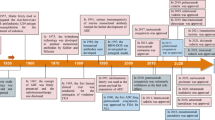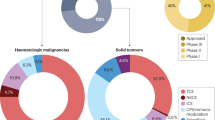Abstract
Mantle cell lymphoma (MCL) is an aggressive B-cell lymphoma with poor clinical outcome. Although front therapy induces a high rate of complete remission (CR), relapse is inevitable and new regimens are much needed for relapsed MCL. The proteasome inhibitor bortezomib (BTZ) induces apoptosis and sensitizes MCL cells to chemotherapy in relapsed MCL, but CR rates are low, with a short duration of response and severe toxicity. Here we evaluated whether BTZ is additive or synergistic with cyclophosphamide (CTX) and rituximab (RTX). Increasing doses of BTZ with a fixed dose of RTX and CTX (BRC regimen) resulted in markedly synergistic growth inhibition of MCL cells. BRC significantly enhanced apoptosis in MCL cell lines and primary tumor cells compared with single-agent treatment. Furthermore, western blotting analysis indicated that BRC induces apoptosis earlier via activation and cleavage of caspases-8, -9 and -3, and poly (ADP-ribose) polymerase, than single-agent treatment. The pan-caspase inhibitor completely blocked apoptosis induced by BRC. In vivo studies showed that BRC eradicated subcutaneous tumors in MCL-bearing SCID mice and significantly prolonged the long-term event-free survival in 70% of the mice. Hence, our study demonstrates that cytoreductive chemotherapy with both BTZ and anti-CD20 antibody may offer a better therapeutic modality for relapsed MCL.
This is a preview of subscription content, access via your institution
Access options
Subscribe to this journal
Receive 12 print issues and online access
$259.00 per year
only $21.58 per issue
Buy this article
- Purchase on Springer Link
- Instant access to full article PDF
Prices may be subject to local taxes which are calculated during checkout





Similar content being viewed by others
References
Fisher RI . Mantle cell lymphoma: at last, some hope for successful innovative treatment strategies. J Clin Oncol 2005; 23: 657–658.
Bertoni F, Rinaldi A, Zucca E, Cavalli F . Update on the molecular biology of mantle cell lymphoma. Hematol Oncol 2006; 24: 22–27.
Campo E, Raffeld M, Jaffe ES . Mantle-cell lymphoma. Semin Hematol 1999; 36: 115–127.
Romaguera JE, Fayad L, Rodriguez MA, Broglio KR, Hagemeister FB, Pro B et al. High rate of durable remissions after treatment of newly diagnosed aggressive mantle-cell lymphoma with rituximab plus hyper-CVAD alternating with rituximab plus high-dose methotrexate and cytarabine. J Clin Oncol 2005; 23: 7013–7023.
Lenz G, Dreyling M, Hoster E, Wormann B, Duhrsen U, Metzner B et al. Immunochemotherapy with rituximab and cyclophosphamide, doxorubicin, vincristine, and prednisone significantly improves response and time to treatment failure, but not long-term outcome in patients with previously untreated mantle cell lymphoma: results of a prospective randomized trial of the German Low Grade Lymphoma Study Group (GLSG). J Clin Oncol 2005; 23: 1984–1992.
Rajkumar SV, Richardson PG, Hideshima T, Anderson KC . Proteasome inhibition as a novel therapeutic target in human cancer. J Clin Oncol 2005; 23: 630–639.
Voorhees PM, Dees EC, O’Neil B, Orlowski RZ . The proteasome as a target for cancer therapy. Clin Cancer Res 2003; 9: 6316–6325.
Adams J . The proteasome: a suitable antineoplastic target. Nat Rev Cancer 2004; 4: 349–360.
O’Connor OA, Wright J, Moskowitz C, Muzzy J, MacGregor-Cortelli B, Stubblefield M et al. Phase II clinical experience with the novel proteasome inhibitor bortezomib in patients with indolent non-Hodgkin's lymphoma and mantle cell lymphoma. J Clin Oncol 2005; 23: 676–684.
Goy A, Younes A, McLaughlin P, Pro B, Romaguera JE, Hagemeister F et al. Phase II study of proteasome inhibitor bortezomib in relapsed or refractory B-cell non-Hodgkin's lymphoma. J Clin Oncol 2005; 23: 667–675.
Strauss SJ, Maharaj L, Hoare S, Johnson PW, Radford JA, Vinnecombe S et al. Bortezomib therapy in patients with relapsed or refractory lymphoma: potential correlation of in vitro sensitivity and tumor necrosis factor alpha response with clinical activity. J Clin Oncol 2006; 24: 2105–2112.
Fisher RI, Bernstein SH, Kahl BS, Djulbegovic B, Robertson MJ, de Vos S et al. Multicenter phase II study of bortezomib in patients with relapsed or refractory mantle cell lymphoma. J Clin Oncol 2006; 24: 4867–4874.
Belch A, Kouroukis C, Crump M, Sehn L, Gascoyne R, Klasa R et al. A phase II study of bortezomib in mantle cell lymphoma: the National Cancer Institute of Canada Clinical Trials Group trial IND.150. Ann Oncol 2007; 18: 116–121.
Ghielmini M, Schmitz SF, Cogliatti S, Bertoni F, Waltzer U, Fey MF et al. Effect of single-agent rituximab given at the standard schedule or as prolonged treatment in patients with mantle cell lymphoma: a study of the Swiss Group for Clinical Cancer Research (SAKK). J Clin Oncol 2005; 23: 705–711.
Coiffier B, Haioun C, Ketterer N, Engert A, Tilly H, Ma D et al. Rituximab (anti-CD20 monoclonal antibody) for the treatment of patients with relapsing or refractory aggressive lymphoma: a multicenter phase II study. Blood 1998; 92: 1927–1932.
Foran JM, Rohatiner AZ, Cunningham D, Popescu RA, Solal-Celigny P, Ghielmini M et al. European phase II study of rituximab (chimeric anti-CD20 monoclonal antibody) for patients with newly diagnosed mantle-cell lymphoma and previously treated mantle-cell lymphoma, immunocytoma, and small B-cell lymphocytic lymphoma. J Clin Oncol 2000; 18: 317–324.
Paoluzzi L, O’Connor OA . Mechanistic rationale and clinical evidence for the efficacy of proteasome inhibitors against indolent and mantle cell lymphomas. BioDrugs 2006; 20: 13–23.
Weigert O, Pastore A, Rieken M, Lang N, Hiddemann W, Dreyling M . Sequence-dependent synergy of the proteasome inhibitor bortezomib and cytarabine in mantle cell lymphoma. Leukemia 2007; 21: 524–528.
Perez-Galan P, Roue G, Villamor N, Campo E, Colomer D . The BH3-mimetic GX15-070 synergizes with bortezomib in mantle cell lymphoma by enhancing Noxa-mediated activation of Bak. Blood 2007; 109: 4441–4449.
Haritunians T, Mori A, O’Kelly J, Luong QT, Giles FJ, Koeffler HP . Antiproliferative activity of RAD001 (everolimus) as a single agent and combined with other agents in mantle cell lymphoma. Leukemia 2007; 21: 333–339.
Foran JM, Cunningham D, Coiffier B, Solal-Celigny P, Reyes F, Ghielmini M et al. Treatment of mantle-cell lymphoma with Rituximab (chimeric monoclonal anti-CD20 antibody): analysis of factors associated with response. Ann Oncol 2000; 11 (Suppl 1): 117–121.
Perez-Galan P, Roue G, Villamor N, Montserrat E, Campo E, Colomer D . The proteasome inhibitor bortezomib induces apoptosis in mantle-cell lymphoma through generation of ROS and Noxa activation independent of p53 status. Blood 2006; 107: 257–264.
Abou-Merhi R, Khoriaty R, Arnoult D, El Hajj H, Dbouk H, Munier S et al. PS-341 or a combination of arsenic trioxide and interferon-alpha inhibit growth and induce caspase-dependent apoptosis in KSHV/HHV-8-infected primary effusion lymphoma cells. Leukemia 2007; 21: 1792–1801.
Ling YH, Liebes L, Zou Y, Perez-Soler R . Reactive oxygen species generation and mitochondrial dysfunction in the apoptotic response to Bortezomib, a novel proteasome inhibitor, in human H460 non-small cell lung cancer cells. J Biol Chem 2003; 278: 33714–33723.
Acknowledgements
This work was supported by institutional start-up funds from The University of Texas M. D. Anderson Cancer Center and funds from the Crutchfield family and the Kimmel family philanthropic foundations. We would like to thank Ms Alison Woo for reviewing and editing this paper.
Author information
Authors and Affiliations
Corresponding author
Rights and permissions
About this article
Cite this article
Wang, M., Han, X., Zhang, L. et al. Bortezomib is synergistic with rituximab and cyclophosphamide in inducing apoptosis of mantle cell lymphoma cells in vitro and in vivo. Leukemia 22, 179–185 (2008). https://doi.org/10.1038/sj.leu.2404959
Received:
Revised:
Accepted:
Published:
Issue Date:
DOI: https://doi.org/10.1038/sj.leu.2404959
Keywords
This article is cited by
-
Midostaurin potentiates rituximab antitumor activity in Burkitt’s lymphoma by inducing apoptosis
Cell Death & Disease (2018)
-
Quantitative real time PCR analysis of apoptotic gene expression in chronic lymphocytic leukemia patients and their relationships with chemosensitivity
Applied Cancer Research (2017)
-
The proteasome and proteasome inhibitors in multiple myeloma
Cancer and Metastasis Reviews (2017)
-
Bortezomib: A Review in Mantle Cell Lymphoma in Previously Untreated Patients Unsuitable for Stem-Cell Transplantation
BioDrugs (2015)
-
Canonical and new generation anticancer drugs also target energy metabolism
Archives of Toxicology (2014)



